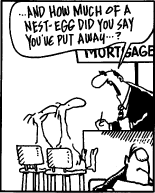Home > Home Buyers Learning Center > Step 2
2. Select Best Mortgage Type

There are many options for financing your home. Before choosing a mortgage loan, ask your lender or personal financial advisor for their opinions. Here is a brief explanation of a few major types of mortgages.
A. Fixed-Rate Mortgage
The most popular type mortgage is a fixed rate conventional mortgage. One advantage of this loan is its stable principal and interest payments. Even if interest rates escalate dramatically, your rate on your loan stays the same. On all loans, however, as property taxes and homeowner’s insurance premiums increase so will your payment. Likewise, should property tax assessments or rates decrease so will your payment. A conventional loan is a loan made to a buyer without a third party participant such as the VA or FHA.
The term of the loan can vary with 15, 20 and 30 year terms being the most common. Whatever the initial life of the loan may be make sure your loan allows you to pay off the principal balance earlier without penalty. Most conventional fixed rate loans are not assumable. Terms of a conventional loan vary among lenders but many can be obtained with as little as a 5-10% down payment. When the down payment is less than 20%, it is necessary to obtain private mortgage insurance (PMI) to protect the lender from a buyer’s default.
 Back to Top
Back to Top
B. Adjustable-Rate Mortgage
As the name implies the adjustable rate mortgage (ARM) allows for the interest rate to increase or decrease over the term of the loan. The interest rate is tied to a financial market index such as one year Treasury bills. Most ARMs set a maximum adjustment or cap on the amount the interest rate can be increased or decreased during any one adjustment period and the total amount the rate can increase over the life of the loan. You should consider whether you can afford the higher payments if the interest rate does go up.
Most ARMs also limit the frequency in which rates can be adjusted. One year, three year and five year adjustment periods are the most common. Adjustable rate mortgages offer lower initial rates, in part because the risk of changing rates is shared by the borrower and lender. This can help you qualify for a larger loan amount or reduce your initial monthly payments. If you accelerate your loan principal repayment, an ARM automatically recalculates and reduces your monthly principal and interest payment.
Adjustable rate mortgages can save you money if you only plan to own your home for a short period of time say three to five years and you can lock in a lower rate for this period of time. These are called Hybrid ARMs where the interest rate is fixed for the first few years of the loan. For example, if the interest rate is fixed for the first 5 years and adjusts every one year thereafter, the loan is known as a 5/1 ARM.
When you are considering an ARM, ask for information about any extra fees you would have to pay if you pay off the loan early by refinancing or selling your home, and whether you would be able to convert your ARM to a fixed-rate mortgage. Adjustable rate mortgages can be especially risky in an inflationary environment when interest rates are headed up. For more information, the Federal Reserve Board publishes a Consumer Handbook on Adjustable Rate Mortgages.
Back to TopC. Federal Housing Administration (FHA) Loan
The Federal Housing Administration offers government-backed mortgage loans through approved lenders. The FHA, which is part of the Department of Housing and Urban Development (HUD), does not make loans but rather it ensures loans allowing lenders to make low down payment loans. This is a feature particularly attractive to first-time home buyers. FHA buyers of single family homes can also finance 100% of their closing costs. If you have had credit problems, such as bankruptcy, it’s easier to qualify for an FHA loan than a conventional loan.
FHA charges an advance mortgage insurance premium (MIP) fee, as well as a monthly charge for all loans to protect the lender in case of default. The upfront portion of MIP can be financed into the loan. FHA insured mortgages offer a maximum loan amount that varies from area to area. To find FHA loan limits Click Here.
Most FHA loans are fully assumable and come with no pre-payment penalty. These loans also require strict appraisal guidelines. FHA loans may only be used for owner occupants and not for investment property. FHA offers both fixed and adjustable rate mortgages to qualified buyers. For more information about FHA loans visit: FHA.com or consult your lender.
Back to TopD. Department of Veterans Affairs (VA) Loan
Qualified veterans can take out loans up to a specific limit with no down payment. This loan program is discussed fully in the Military Mortgage Center section of this website.
Back to TopE. Local & State Housing Authorities
Cities have local housing authorities that administer bond programs designed to help first-time home buyers. To find these programs available in Hampton Roads, Virginia visit: HUD’s Home Buying Programs in Your State website. These programs provide down payment and closing cost assistance. To qualify, home buyers must receive home ownership education from an approved counseling agency and the sales price of the home cannot exceed federal loan limits.
The Virginia Housing Development Authority (VHDA) is the state’s mortgage finance agency. Created in 1972 by the Virginia General Assembly, their mission is to help low- and moderate-income Virginians attain quality, affordable housing.
Congratulations, You Have Graduated to the Next Step >>
Back to Top




